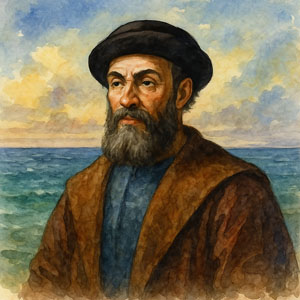
On this day in 1522, after nearly three years at sea, the expedition of Ferdinand Magellan (1480–1521) completed the first circumnavigation of the globe—an epic voyage that changed our understanding of Earth forever.
Magellan was born into nobility in northern Portugal and raised with maps and stars. On behalf of Spain, he set sail in 1519, commanding five ships toward the promise of a westward passage to the Spice Islands. Only one ship would return.
Their journey was brutal and beautiful—marked by frostbite, hunger, and wonder. “There is always a risk in being alive,” said playwright Henrik Ibsen. “And if you are more alive, there is more risk.”
Magellan’s fleet navigated storms and uncharted waters. He discovered the treacherous sea passage at the tip of South America that now bears his name. Of that moment, chronicler Antonio Pigafetta wrote, “I believe that there is not a more beautiful or better strait in the world than this one.”
Always heroic, Magellan died in the Philippines, defending his men. One year later, his last surviving ship, the Victoria, captained by Juan Sebastián de Elcano and just 18 crewmen, arrived in Spain, completing the first circumnavigation of the globe, proving the world’s vastness, its mystery, and our capacity to dream beyond the horizon.
Magellan’s voyage was more than geography... It was a triumph of heart, hunger, and human daring. Writer Tim Joyner called it “the terminal event of the European Renaissance.” It proved the Earth was round, yes—but more than that, it showed what’s possible when we let go of the shore.
 The world still waits for you! 🌍🧭
The world still waits for you! 🌍🧭
